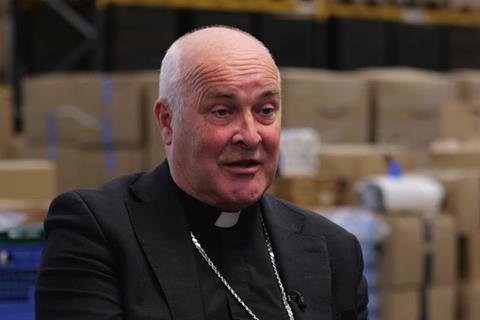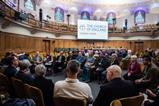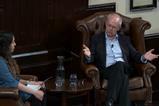Bishops need to be more careful when talking about migration, says Rev Ian Paul. Loving your migrant neighbour does not mean avoiding the tough political questions

When bishops and archbishops speak about migration it always hits the headlines—and never ends well.
In 2016, Justin Welby got into trouble when he said that it was quite reasonable to ‘fear’ the consequences of mass migration. ”There is a tendency to say ‘those people are racist’, which is just outrageous, absolutely outrageous.” But in 2023, he got into trouble in the opposite direction, when he said that Government plan to crack down on illegal immigration were “morally unacceptable and politically impractical”. Different comment; same result.
Now, Stephen Cottrell, the Archbishop of York, has dived into the issue, as has Steven Croft, bishop of Oxford, with criticisms of Nigel Farage’s plans to deport illegal migrants.
In an interview with Trevor Phillips on Sky News, Cottrell called Farage’s approach a “isolationist, knee-jerk response” which “will not solve the problem”. The first part of the interview focused on child poverty, but it then moved to the question of migration, and the Reform policy, and Cottrell seemed happy to talk about it.
And this, I think, it where the problems began.
The gospel is not political, but it has clear political implications. So it should not surprise us when Christian leaders comment on political issues. But when they do, I look for three things: that they are well informed; that they are theologically grounded; and that they are pastorally helpful. I am not sure that Stephen Cottrell’s comments met any of these tests.
Massive change
Migration is a massive issue in Britain, and has been for many years. Legal migration has been at very high levels for at least the last 20 years, reaching the unprecedented record of over 900,000 in 2023. One in six people in England and Wales was not born here, and as migrants tend to be younger and have more children, the impact on schools is massive. 40% of primary age children have at least one foreign-born parent; for 20%, English is not their first language.
You cannot have that level of change in a country without it having an impact. And successive governments have failed to address the issues it raises. It has been claimed that this has been necessary because of a skills gap—but that gap has been created by a failure of policy. 26% of NHS doctors are trained abroad, because the government has set a cap on university places for medicine. Our schools education policy appears to be ‘Do whatever you want’ rather than ‘Train to do the jobs that need doing’.
This is the backdrop to the two other forms of migration—asylum seekers, and illegal migrants. To comment on any of these three issues, we need both to disentangle from the others, but also be aware of the impact each issue has on the other. People whose lives have been changed by ‘planned’ migration—and resent it—are going to respond to illegal migration in the light of that.
Illegal migration appears to be out of control. It has ballooned since 2020, so that there were as many illegal migrants in the last year (44,000) as there were total migrants in each year in the 1990s. For a political leader like Nigel Farage to say something drastic needs to be done can hardly be knee jerk.
As the population has grown by this 20% through migration, we have not built 20% more homes, we have not built 20% more hospitals, and we have not built 20% more schools. The policy has been uncoordinated and ill thought through.
And is it really moral to draw skilled and motivated workers from poorer countries that need them more? If Christian leaders have not considered this complexity of issues, commenting on specific political is walking into a minefield.
Inadequate theology
If Stephen’s analysis was thin, so was his theology. He reached for Jesus’ command “You shall love your neighbour as yourself”, but we need to ask the same question Jesus was asked: who is my neighbour? How do we love our neighbour in our own street who is struggling to afford a home, and whose wages are depressed, because of the changes that mass migration has brought?
This is not a question of narrow nationalism, and is not a zero sum game in relation to the needs of others. But it does require us to think about the role of government, and what is “the problem” that Stephen Cottrell thinks needs to be solved. Yes, there is a global crisis about migration, and our government needs to work with others to address that. But the first responsibility of any government is the security, safety, and welfare of its own citizens.
The vast majority of those crossing the channel by boats are young men, motivated by the economic opportunities in the West, who have enough energy and resources to make the journey. And migrants are disproportionately represented in crime figures. You cannot love your neighbour without facing these challenging realities.
Disconnected
Finally, are these kinds of comments pastorally helpful? One answer would be to look at the public comments made on YouTube or the newspaper reports—and this would suggest a resounding ‘no’! Perhaps a better test would be look at the views of members of the Church of England. A recent survey suggested that 38% would vote Reform—so Stephen’s comments are completely out of step with the members of the church he leads.
This is part of a long-standing issue—that the bishops of the Church of England seem disconnected from the views of those in the pews. More than 60% of Anglicans voted for Brexit, while a single bishop out of the 104 did (and he quickly stepped back from episcopal ministry).
I make all these observations as someone deeply shaped by migration. I am the son of a migrant; my mother came to the UK after the second world war, and experienced the prejudice and discrimination that many Irish did then. I am minister at a church which has welcomed asylum seekers from Iran, central America, and Hong Kong, so we have our services in four different languages. And I share my home with a migrant from Asia.
Loving your migrant neighbour does not mean avoiding asking hard questions on the issue—and loving our indigenous neighbour means we have to.
I would love to see our bishops doing both.






































5 Readers' comments